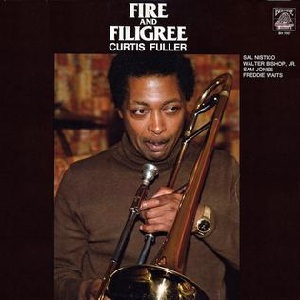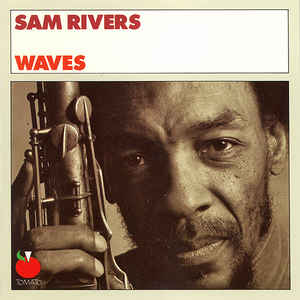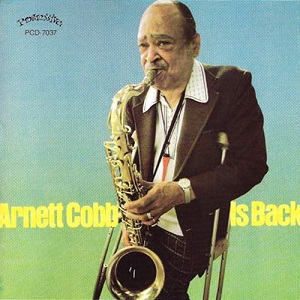Monday, November 30, 2020
Bunky Green – Places We've Never Been (Vanguard, 1979)
Steve Lacy Five – The Way (hat Hut, 1980)
Saturday, November 28, 2020
Eddie "Lockjaw" Davis – The Heavy Hitter (Muse/32 Jazz/Savoy, 1979)
Eddie "Lockjaw" Davis (ts); Albert Dailey (p); George Duvivier (b); Victor Lewis (d)
Recorded on January 18, 1979
Eddie "Lockjaw" Davis was remarkably consistent throughout his career. With his growling tone and take-no-prisoners approach, it's nearly impossible to imagine him playing with indifference.
This session, originally recorded for Muse, benefits from a top-shelf rhythm section. The LP is one of the finest that Davis made during the 1970s.
More Eddie "Lockjaw" Davis
- Leapin' on Lenox (Black & Blue, 1974)
- Swingin' Till the Girls Come Home (SteepleChase, 1976)
- Straight Ahead - with the Tommy Flanagan Trio (Pablo, 1976)
- Light and Lovely (Black & Blue, 1979); also released as Sweet and Lovely (Classic Jazz)
Poncho Sanchez – Poncho (Discovery, 1979)
Daniel Humair – Triple Hip Trip (Owl, 1979)
Wednesday, November 25, 2020
Denny Zeitlin – Soundings (1750 Arch, 1978)
Ross Tompkins – Ross Tompkins and Good Friends (Concord, 1978)
Sunday, November 22, 2020
Chico Freeman – The Outside Within (India Navigation, 1981)
Arthur Blythe – Lenox Avenue Breakdown (Columbia, 1979)
World Saxophone Quartet – Steppin' with the World Saxophone Quartet (Black Saint, 1979)
Philip Catherine, Charlie Mariano, Jasper van 't Hof – Sleep My Love (CMP, 1979)
Wednesday, November 18, 2020
John Abercrombie Quartet – Arcade (ECM, 1979)
George Coleman – Amsterdam After Dark (Timeless, 1979)
Jimmy Forrest with Shirley Scott – Heart of the Forrest (Palo Alto/Muse, 1982)
Monday, November 16, 2020
Chet Baker – Broken Wing (Sonopresse/Inner City/Gitanes Jazz, 1979)
Chet Baker (tr, vo); Phil Markowitz (p); Jean-François Jenny-Clark (b); Jeff Brillinger (d)
Recorded on December 28, 1978
Broken Wing is one of Baker's finest albums from his final years.
John Coates, Jr. – In the Open Space (Omnisound, 1979)
Ronnie Mathews – Roots, Branches & Dances (Bee Hive, 1979)
Curtis Fuller – Fire and Filigree (Bee Hive, 1979)
Zbigniew Seifert – Passion (Capitol, 1979)
Zbigniew Seifert (vn); John Scofield (g); Richie Beirach (p); Eddie Gomez (b); Jack DeJohnette (d); Naná Vasconcelos (perc); unnamed strings
Recorded in November 1978
I suppose most jazz listeners (particularly those from the U.S.) are unfamiliar with the name Zbigniew Seifert. The Polish jazz violinist—known as “Zbiggy” to his friends—died of lung cancer at just 32 years of age. He only released a handful of recordings as a leader during his short life. But Seifert’s influence has been profound, particularly in his home country, where his music is held in especially high esteem. (One indicator of his home country’s regard: In 1996, the Polish government issued a postage stamp featuring a portrait of Seifert.)
Seifert attended the Fryderyk Chopin Musical High School in Kraków, graduating in 1970. His fascination with the music of John Coltrane led him to jazz, and Seifert regularly performed with his fellow-countryman Tomasz Stańko from 1967 to 1973. Initially, Seifert's primary instrument was the saxophone, but later he chose to focus on the violin. As Seifert’s reputation grew, he was invited to perform and record with many prominent European jazz musicians, including Volker Kriegel, Jasper van ‘t Hof, Joachim Kühn, Hans Koller, Wolfgang Dauner, Albert Mangelsdorff, and Chris Hinze. Seifert’s first recording as a leader, Man of the Light (MPS, 1977), took his career to even greater heights. Subsequently, Seifert signed a record deal with Capitol Records.
Passion was Seifert’s second album for Capitol, recorded in November 1978. Just a few months later, on Feburary 15, 1979, Seifert died. Even though he was terribly sick while making the record, the music bursts with vitality. In a 2019 interview, Richie Beirach, the pianist on Passion and one of Seifert’s close friends, explains:
"The last recording we did together was called Passion, and it’s a total motherfucker! Zbiggy, myself, Jack DeJohnette, John Scofield, Eddie Gomez and Naná Vasconcelos—plus a chamber orchestra consisting of the best players from the NY Philharmonic. Amazing original compositions for small group jazz ensemble and chamber orchestra. The record is out of print and never even came out on CD! The fools at Capitol Records still don’t know what they have and for some reason they won’t re-release it! It’s [Seifert’s] greatest recording and easily one of the most important recorded statements of contemporary jazz plus string ensemble ever! … By then he was already very ill and was undergoing heavy chemotherapy treatments. He lost weight and all of his hair, but was still on fire in the studio. You could see that he knew that this was going to be his last recording. We were all very moved and freaked out by his appearance, but buoyed by his absolutely iron will and powerful, inspired playing. He fired us up in a way that I have rarely heard."
Beirach also had this to say about Seifert:
"Zbiggy was like a Polish Icarus: Flying too close to the burning sun of creativity. The beating heart of Polish music and the living incarnation of the essence & spirit of Trane and McCoy, with the violin as the point of entry. He was the real source of contemporary jazz violin, copied by many without ever getting the true credit he deserved."
What Next?
If you’re new to Zbiggy and enjoy Passion, you should check out Man of the Light next. Unlike Passion, which has never been reissued in any digital format, Man of the Light is readily available.
Bill Evans & Toots Thielemans – Affinity (Warner Brothers, 1979)
Sunday, November 8, 2020
Johnny Griffin – The Return of the Griffin (Galaxy, 1979)
Rodney Jones – Articulation (Timeless/Timeless Muse, 1978)
Andrew Cyrille & Maono – Metamusicians' Stomp (Black Saint, 1978)
More Andrew Cyrille
Ira Sullivan – Peace (Galaxy, 1979) and Multimedia (Galaxy, 1982)
Max Roach & Anthony Braxton – Birth and Rebirth (Black Saint, 1978)
Leroy Jenkins – Space Minds, New Worlds, Survival of America (Tomato, 1979)
Bill Barron – Jazz Caper (Muse, 1982)
Sunday, November 1, 2020
Buddy Tate & the Muse Allstars – Live at Sandy's (Muse, 1980) and Hard Blowin': Live at Sandy's (Muse, 1984)
Sam Rivers - Waves (Tomato, 1979)
Anthony Davis – Of Blues and Dreams (Sackville, 1979)
Anthony Davis (p); Leroy Jenkins (vn); Abdul Wadud (vc); Pheeroan akLaff (d)
Recorded on July 30 - 31, 1978
From this listener's perspective, pianist Anthony Davis is one of the most interesting musicians to emerge and initially make their mark in the 1970s.
Davis' art draws liberally from the world of contemporary classical music. You can see that in his choice of instrumentation on this LP. But his expressive and personal voice always makes his music seem idiomatic and immediate, regardless of style.
More Anthony Davis
Look for one of Davis' collaborations later in the survey.
Johnny Dyani Quartet – Song for Biko (SteepleChase, 1979)
Shirley Horn – A Lazy Afternoon (SteepleChase, 1979)
Mike Nock Quartet – In, Out and Around (Timeless/Timeless Muse, 1978)
Arnett Cobb – Arnett Cobb Is Back (Progressive, 1979)
Project Wrap Up
I've now listed all 366 entries in my survey, one for each day of the year in 2020. Before ending the project, I wanted to share some mo...

-
I've now listed all 366 entries in my survey, one for each day of the year in 2020. Before ending the project, I wanted to share some mo...
-
Bill Evans (p); Marc Johnson (b); Joe LaBarbera (d) Recorded on November 29, 1979 Bill Evans died less than a year after making these record...
-
Anita O'Day (vo); Georges Arvanitas (p); Jacky Samson (b); Charles Saudrais (d) November 7, 1970 In 2006, author John Fordham had...




































